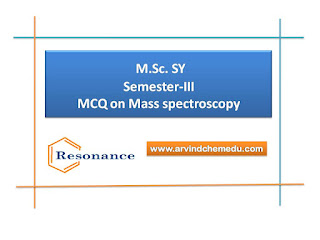M. Sc. Second year Postgraduate degree course
Third Semester
CHE - 313 Structural
Elucidation by Spectral methods
Mass Spectroscopy Introduction, ion production (EI, CI, FD and FAB), ion analysis, ion
abundance, factors affecting on fragmentation, fragmentation of different
functional groups, molecular ion peak, isotopic peaks, metastable peak,
Nitrogen rule, McLafferty rearrangement, Retro Diels - Alder reaction.
1. In mass spectrometry 81Br shows:
(a) M+1 peak
(b) M+2 peak
(c) M+3 peak
(d) M+4 peak
2. Klystron is used as radiation
source in
(a) X-ray diffraction
(b) Electron spin resonance
(c) Mass spectrometry
(d) None of above
3. In mass spectra, the most intense
peak is the
(a) Base peak
(b) Metastable ion peak
(c) Fragment ion peak
(d) Rearrangement ion peak
4. Which of following ionization
technique is used in molecular weight determination of large biomolecule by
using mass?
(a) Electron impact
(b) Chemical ionization
(c) MALDI
(d) None of the above
5. A mass spectrometer bombards
molecules with a high energy electron beam in
(a) Colloidal Phase
(b) Liquid Phase
(c) Solid State
(d) Vapour Phase
6. The inert gas used in the
ionization stage of mass spectrometry is
(a) Helium
(b) rgon
(c) Xenon
(d) Methane
7. The correct order for the basic
features of a mass spectrometer is _____________
(a) Acceleration, deflection,
detection, ionization
(b) Ionisation, acceleration, deflection, detection
(c) Acceleration, ionisation,
deflection, detection
(d) Acceleration, deflection,
ionisation, detection
8. Principal involved in mass
spectrometer is
(a) Excitation of electron
(b) Electron impact bombardment
(c) Molecular vibration
(d) Splitting of electrons magnetic
energy
9. Separation of ions in mass spectrometer take place on the
basis of which of the following?
a) Mass
b) Charge
c) Molecular weight
d) Mass
to charge ratio
10. In mass spectroscopy positively
charged ions can be produced by
(P) Heating the sample
(Q)Bombarding the sample with high
energy electrons
(R) Bombarding the sample with high
energy protons
(S) Chemical oonization
(a) Q, S
(b) Q, R
(c) P, R
(d) P, S
11. In mass spectrum M-18 peak
indicates loss of
(a) Hydroxyl group
(b) Hydrogen
(c) Methyl group
(d) Water molecule
12. In mass spectrum of toluene,
widely the Meta stable peak appear at
(a) 91 m/e
(b) 77 m/e
(c) 46.6 m/e
(d) 64.5 m/e
13. Metastable peaks have following
all characteristics except
(a) These peaks are much broader that
is they spread over mass units
(b) These peaks are of high intensity
(c) These peaks appear in the mass
spectrum usually at non-integral m/e value
(d) The meta stable ions can be
detected by a double focusing mass spectrometer
14. Removal of a single electron from
a molecule results in the formation of
(a) Fragment ion
(b) Metastable ion
(c) Molecular ion
(d) Rearrangement ion
15. Which of the following statement
is false for mass spectroscopy?
(a) Mass
spectroscopy is used to identify unknown compounds within a sample, and to
elucidate the structure and chemical properties of different molecules
(b) Particle are characterized by their mass to
charge ratios (m/z) and relative abundances
(c) This technique basically studies the effect
of ionizing energy on molecules
(d) This technique can be used on all state of matter
16. In which state of matter mass
spectroscopy is being performed?
(a) solid
(b) liquid
(c) gaseous
(d) plasma
17. Which species of the following is
used to bombard with the sample for which mass spectroscopy has been performed?
(a) Alpha particles
(b) Neutrons
(c) Electrons
(d) Protons
18.In a time-of-flight
mass spectrometer, the velocity v of an accelerated ion is related to its mass
by which of the following?
(a) proportional to m
(its mass)
(b) inversely
proportional to its mass
(c) proportional to the
square root of its mass
(d) inversely proportional to the square root of its mass
19.Which of the
following formulae is consistent with a molecular ion of m/z 73 in a mass
spectrometry experiment?
(a) C3H8N2
(b) C4H11N
(c) C4H10O
(d) C3H5NO
20.An accurate mass
measurement on a molecular ion peak gives the value of 72.0583. Identify the
appropriate formula as one of the following.
(a)C3H4O3
(b)C4H8O
(c)C2H4N2O
(d)C3H8N2
21.In the mass spectrum
of the molecule phenol, C6H5OH, the approximate intensity of the peak at m/z
95, relative to the molecular ion at 94 will be which of the following?
(a) 94%
(b) 6.6%
(c) 10.0%
(d) 7.0%
22.For the molecule CBr4, the number of peaks which comprise the
cluster for the molecular ion will be which of the following?
(a) 1
(b) 4
(c) 5
(d) 3
23.In the mass spectrum of the molecule CBr4 (see preceding
question) the relative intensities of the peaks in the molecular ion will be
which of the following?
(a) 1:1:1:1:1
(b) 1:2:2:2:1
(c) 1:4:6:4:1
(d) 1:3:4:3:1
24.In the mass spectrum of the molecule benzyl alcohol
(C6H5CH2OH), the base peak would be predicted to correspond to which of the
following structures?
(a) C6H5+
(m/z 77)
(b) C6H5CH+OH (m/z
107)
(c) C6H5CH2O+
(m/z 107)
(d) +C6H4CH2OH
(m/z 107)
25.In the mass spectrum of the molecule
ethyl propanoate, CH3CH2C(O)OCH2CH3
(molar mass 102), a typical peak would be expected from a McLafferty 'rearrangement/fragmentation.'
This would be found at an m/z corresponding to which of the following?
(a) 29
(b) 74
(c) 45
(d) 87
Mass Spectroscopy MCQ M.Sc. Chemistry third semester CHE-313
ESR Spectroscopy mcq M.Sc. II Organic Chemistry
Pericyclic reactions ,Photochemistry, Free radicals mcq M.Sc. SY Organic Chemistry
Asymmetric Synthesis and Bio -Organic Chemistry MCQ Unit-III M.Sc. Chemistry Sem.III
Asymmetric Synthesis and Bio -Organic Chemistry MCQ Unit-II M.Sc. Chemistry Sem.III
Asymmetric Synthesis and Bio -Organic Chemistry MCQ Unit-1 M.Sc. Chemistry Sem.III
C13 NMR Spectroscopy MCQ M.Sc. Chemistry third semester CHE-313
H1 NMR spectroscopy MCQ M.Sc. II Third semester paper CHE-313
Old Question papers Semester-III
Sigmatropic reactions pdf, M.Sc. Chemistry S.Y., Third Semester
Elctrocyclic reactions pdf , M.Sc. Chemistry Second year, Third Semester
Pericyclic Reactions Introduction, Cycloaddition Reactions, pdf








